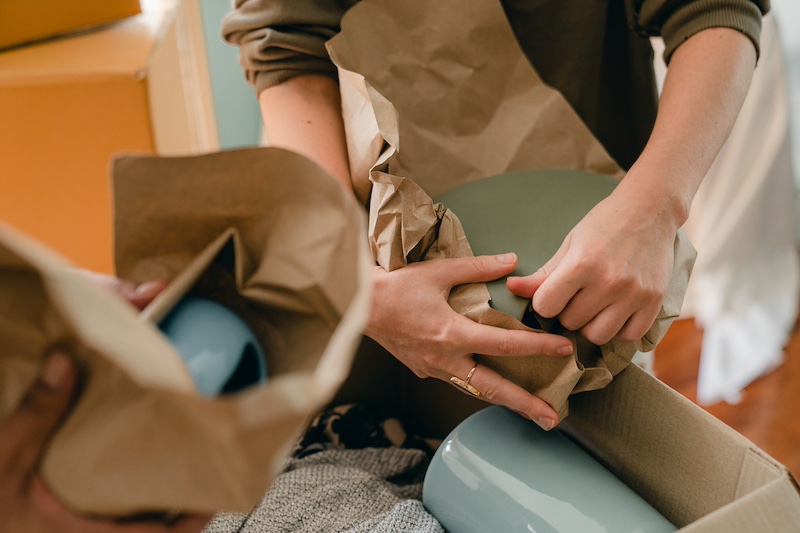So, you’ve finally landed your dream apartment. It’s all smooth sailing from here, right?
Well, not completely. Now’s the time for that little thing called moving. And it can certainly help to have a proper ‘moving out checklist’ to organize your efforts and avoid stress.
We’ve done the dirty work of creating the ultimate moving out checklist, so you don’t have to. It’ll save you quite a bit of stress—and several Advils. And if you’re short on time, click below for a mobile-friendly checklist of general steps to follow in the months and days leading up to your move.
BEFORE THE MOVE
Two months out: Plan ahead, get organized
1. Choose your move-in date. Pro tip: If you can, move in the middle of the month for better rates with your moving company.
2. Ask for time off from work if you’re moving on a weekday.
3. Take measurements of your new apartment, so you’ll know what furniture will fit. Don’t forget to measure the door, elevator, or stairway to avoid any moving day nightmares.
4. Set a budget for your move, taking into account the cost of a moving company, boxes, supplies, moving insurance, etc. Calculate how much extra cash you’ll need to save over the next few months to make up for the moving costs, and set a tighter budget for your day-to-day spending. (Here’s our science-backed guide to meeting your spending goals, effortlessly.)
5. Research different moving companies available in your area, and get an estimate from each of them. Make sure they’re licensed and insured by verifying their DOT number.
6. Book your moving company—and when you do, make sure to do these things:
- Tell ‘em about any additional services you’ll need, like extra stops at a storage unit
- Read over the contract before signing anything
- Get written confirmation of your moving date and costs (store this in your Google Drive!)
- Get moving insurance to cover all your stuff during the move (because renters insurance doesn’t cover stuff handled by movers).
- Or, if you’ve decided to forgo movers and do it yourself (heroic), check out our comprehensive guide here.

Six weeks out: Sort through your stuff
1. Sort through your stuff, and figure out what you want to get rid of. Divide them into two categories: To sell, and to donate.
2. Calculate the value of the things you want to sell with a furniture calculator (we suggest using Splitwise or Blue Book Furniture).
3. Post the stuff you want to get rid of on a local Facebook group, or, better yet, have a garage sale party at your house.
4. Designate a few donation boxes for the things you want to give away. Deposit your clothing in a drop-off bin or at a local charity. If you’ve made the switch to e-books and are looking to lighten your load, children’s shelters, schools in underfunded districts, and prisons are all in need.
5. Document all the stuff you’re going to keep; it’s a great way to ensure that if anything ever happens to it in the future, you’ll be able to seamlessly make a claim with your insurance provider.
One month out: Prepare to pack, and update your info
1. Start gathering boxes for the stuff you’re taking with you. Ask your local retailers, grocery stores, businesses, or liquor stores to use their extra boxes. Also, check out the Craigslist free section. These things add up.
2. Notify people/parties of your new address
From notifying service providers to updating your driver’s license, there’s a mountain of tasks that need your attention when you move.
Check out our in-depth change of address checklist of who—and when—to notify to make every switch as smooth as possible.
3. Transfer your renters insurance to your new address, meaning buy a new renters policy for your new digs and make sure to set your move-in date as your effective date (and don’t forget to cancel your old policy when you move.)
4. Gather your moving boxes, and label each box with (A) the room it’s destined for and (B) a number. Make sure to label on the side of the box, not the top, so you’ll be able to see it when the boxes are stacked.
5. Start packing things that you don’t use as much—such as out-of-season clothes or dusty kitchen equipment.

Two weeks out: Begin packing, get ready to leave
1. Confirm with your new landlord if there are any move-in requirements (i.e., having an active renters insurance policy before move in).
2. Take pics of electronics—like your TV or gaming console, with any necessary wires plugged in—so you won’t have any trouble assembling them at your new place.
3. Pack up your kitchen:
- Wrap breakables, like glasses or fancy hand-me-down china, in sheets or towels
- Put styrofoam plates in between breakable plates to avoid disaster
- Tuck knives inside oven mitts to prevent injuries
- Donate any unused food to an organization like Move For Hunger
4. Start packing up your room, minus the essentials you’ll need for the next two weeks. Here are some hacks:
- Pack heavier items in suitcases
- Put all hanging clothes in trash bags (rather than taking them off their hangers)
- Put jewelry in egg cartons to keep it from tangling
- Pack any valuable/sentimental items in a separate box, to keep a close eye on them during moving day
5. Pack up stuff in other rooms you won’t need over the next 2 weeks
6. If you’re moving to a new part of town, cancel your membership at the local gym, yoga studio, and so on.
7. Refill your prescriptions, and transfer them to a new pharmacy near your new apartment. (A lot of pharmacies let you do this through their online portal!)
8. Schedule a cleaning service to clean up your apartment a few days before move out
One week out: Sort out the small things
1. Prepare a week of meals in advance, or plan to order takeout, because the last thing you’ll want to do this week is cook every day.
2. Back up your computer; if something goes wrong, you’ll be thankful you have all your data in one place.
3. Reconfirm the arrangements (pick-up, time frame, price) with your moving company.
A few days out: Finish up, clean up
1. Pack an ‘essentials box,’ and put in anything you think you’ll need for the first 24 hours in your new apartment: toothbrush, toothpaste, phone charger, toilet paper, a change of clothes, laptop, laptop charger.
2. Pack up the rest of your stuff (!!!) and if you plan on moving heavy furniture yourself, start preparing it for the move—like wrapping it in moving blankets, or breaking it down into smaller pieces—and clearing a path in your apartment.
3. Stop watering any plants you have so they’re not heavy (or dripping) on the big day.
4. If you have smaller plants, pack ‘em in your moving boxes. Be sure to stuff paper around the base of the pots to hold them in place, and punch air holes in the boxes to let them breathe.
5. If you’re bringing your fridge with you, empty, clean, and defrost it at least 24 hours before the move. Lay a towel in front of it to absorb excess water.
6. Set aside cash to tip your movers. You should plan to tip around 10-20% of the total moving cost to each mover, but tipping etiquette also depends on the circumstances.

DURING THE MOVE
Moving day: Double check everything, and say hello to your new digs!
1. Take pics of the place you’re leaving to prove it’s in prime move-out condition
2. If you’ve already turned in your keys, take precautions to make sure you’re not locked out: String a rubber band around one door knob, cross it over, and wrap it to the other side to keep the door from locking
3. Do a final walk-through of your apartment, and ask yourself these things:
- Are all the windows closed and locked?
- Did you forget to take anything?
- Are the heater and/or air conditioner turned off?
- Is the water shut off?
- Have you turned in all the apartment keys?
- Are all the doors closed and locked?
4. When you arrive at your new digs, make sure your movers put each box in the room it’s labeled for.
5. Double check to make sure all your boxes are there, and nothing is damaged.
6. Tip your movers! They’ve earned it.
7. Once the movers leave, make your bed and unpack your shower stuff. You’re going to want to take a nap and get clean, not necessarily in that order.
8. Take pics of your new place, focusing on any potential damage you might have missed during earlier visits. Email the pics to yourself so they’re dated—this will give you a reliable record for the future.
9. Unpack your other essentials: towels, dishes, lamps, anything work-related, and any pet supplies.
10. Breathe in, breathe out, and take it all in. You did it!
Before we pack up and go…
Still looking for the right apartment? Whether you’re searching in New York or Minneapolis, check out our guide of things to ask when renting an apartment.
And once you’re settled into your new digs, check out Lemonade renters insurance, and keep your stuff covered:
A few quick words, because we <3 our lawyers: This post is general in nature, and any statement in it doesn’t alter the terms, conditions, exclusions, or limitations of policies issued by Lemonade, which differ according to your state of residence. You’re encouraged to discuss your specific circumstances with your own professional advisors. The purpose of this post is merely to provide you with info and insights you can use to make such discussions more productive! Naturally, all comments by, or references to, third parties represent their own views, and Lemonade assumes no responsibility for them. Coverage and discounts may not be available in all states.




